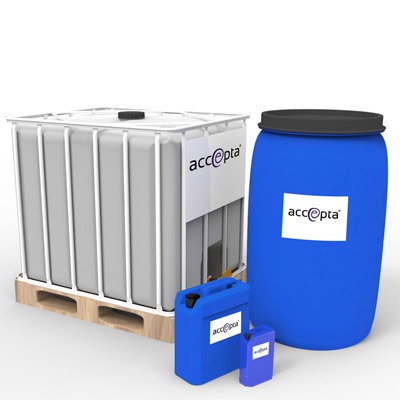CB66 / AT-2112 – Polymer Phosphate Scale Inhibitor for Steam Boilers
- Home
- Water Treatment Chemicals
- Boiler Water Treatment Chemicals
- Sludge Conditioner
- CB66 / AT-2112 – Polymer Phosphate Scale Inhibitor for Steam Boilers
£150.10 ex. VAT
Quantity discount tiers
5-8
17%
DISCOUNT
9-16
25%
DISCOUNT
17-31
30%
DISCOUNT
32+
33%
DISCOUNT
Prices are for 25Kg Drums/Kegs. POA for 200kg/IBCs.
Description
CB66 / AT-2112 is a high performance combined polymer phosphate scale inhibitor treatment scientifically formulated for use in steam boiler systems up to 1500 psig.
CB66 / AT-2112 is used as a scale inhibitor and control agent for suspended solids.
CB66 / AT-2112 is best used for softened and low hardness water. The phosphate component of CB66 / AT-2112 reacts with the water hardness, whilst the polymer components provide transport of the calcium, magnesium, iron, phosphate and silica through the boiler, preventing scale adhering to the internal metal surfaces.
Product Benefits
- Superior quality combined phosphate and polymer steam boiler treatment.
- Excellent for use in softened and low hardness waters.
- Performance scale inhibitor and control agent for suspended solids.
Product Properties
| Appearance: | Clear liquid |
| Solubility in water: | Miscible |
| Odour: | None |
| Solubility in other solvents: | Not known |
| pH: | 6-7 |
| Partition coefficient and N-octanol/water: | Not known |
| Boiling Point/Boiling Range: | Not determined |
| Melting Point/Melting Range: | Not applicable |
| Flash Point: | Not applicable |
| Flammability: | Not applicable |
| Explosive Properties: | Not applicable |
| Oxidising Propertie: | Not applicable |
| Vapour Pressure: | Not determined |
| Relative Density: | 1.20 approx |
*Full details of the product properties are available in the Safety Data Sheet. See below.
Application & Dosage Information
Use CB66 / AT-2112 direct from the drum or mixed with soft water, or cool condensate in a dosing tank. In low pressure steam boilers (below 20 bar g) dose to generate 30 – 70ppm PO4 within the boiler water.
20 – 40 bar g use 20 – 40ppm PO4 in the boiler.
40 – 60 bar g use 15 – 20 ppm PO4.
Above 60 bar g 10ppm.
For best results dose CB66 / AT-2112 continuously proportional to the feedwater use.
To remove calcium and leave a PO4 residual the dosage rate is:
Product ppm = (Feed Calcium Hardness x 4.2) + [(PO4 residual as above x 7.4)/concentration factor].
It is always advisable to carry out a ‘Control Of Substances Hazardous to Health’ (COSHH) assessment before use.
For further technical assistance please contact us.
Safety, Storage & Handling
For full details concerning safety precautions, storage and handling procedures for this product please refer to the latest Safety Data Sheet.
To request the latest MSDS for this product please fill out the form below.
Additional information
| Weight | 25 kg |
|---|---|
| Dimensions | 30 × 23 × 47 cm |
Description
CB66 / AT-2112 is a high performance combined polymer phosphate scale inhibitor treatment scientifically formulated for use in steam boiler systems up to 1500 psig.
CB66 / AT-2112 is used as a scale inhibitor and control agent for suspended solids.
CB66 / AT-2112 is best used for softened and low hardness water. The phosphate component of CB66 / AT-2112 reacts with the water hardness, whilst the polymer components provide transport of the calcium, magnesium, iron, phosphate and silica through the boiler, preventing scale adhering to the internal metal surfaces.
Product Benefits
- Superior quality combined phosphate and polymer steam boiler treatment.
- Excellent for use in softened and low hardness waters.
- Performance scale inhibitor and control agent for suspended solids.
Product Properties
| Appearance: | Clear liquid |
| Solubility in water: | Miscible |
| Odour: | None |
| Solubility in other solvents: | Not known |
| pH: | 6-7 |
| Partition coefficient and N-octanol/water: | Not known |
| Boiling Point/Boiling Range: | Not determined |
| Melting Point/Melting Range: | Not applicable |
| Flash Point: | Not applicable |
| Flammability: | Not applicable |
| Explosive Properties: | Not applicable |
| Oxidising Propertie: | Not applicable |
| Vapour Pressure: | Not determined |
| Relative Density: | 1.20 approx |
*Full details of the product properties are available in the Safety Data Sheet. See below.
Application & Dosage Information
Use CB66 / AT-2112 direct from the drum or mixed with soft water, or cool condensate in a dosing tank. In low pressure steam boilers (below 20 bar g) dose to generate 30 – 70ppm PO4 within the boiler water.
20 – 40 bar g use 20 – 40ppm PO4 in the boiler.
40 – 60 bar g use 15 – 20 ppm PO4.
Above 60 bar g 10ppm.
For best results dose CB66 / AT-2112 continuously proportional to the feedwater use.
To remove calcium and leave a PO4 residual the dosage rate is:
Product ppm = (Feed Calcium Hardness x 4.2) + [(PO4 residual as above x 7.4)/concentration factor].
It is always advisable to carry out a ‘Control Of Substances Hazardous to Health’ (COSHH) assessment before use.
For further technical assistance please contact us.
Safety, Storage & Handling
For full details concerning safety precautions, storage and handling procedures for this product please refer to the latest Safety Data Sheet.
To request the latest MSDS for this product please fill out the form below.
Additional information
| Weight | 25 kg |
|---|---|
| Dimensions | 30 × 23 × 47 cm |
Data Sheets & enquires
To request the safety or technical data sheets on this product or simply enquire further about chemical supply please fill out this contact form.
Contact us
Please complete this form and we will be in touch
